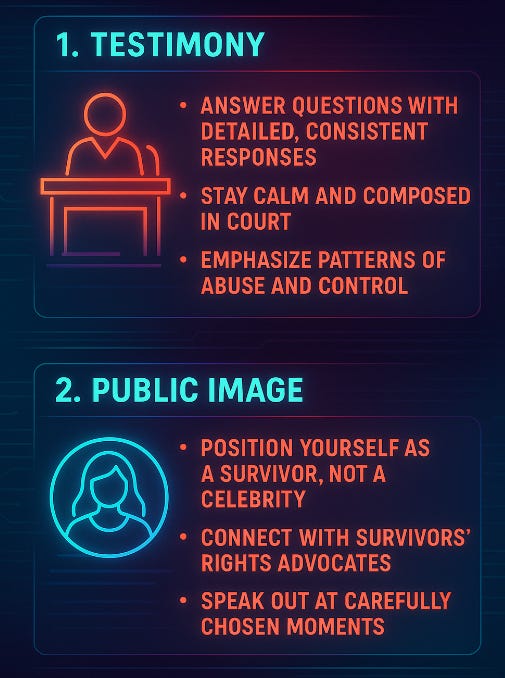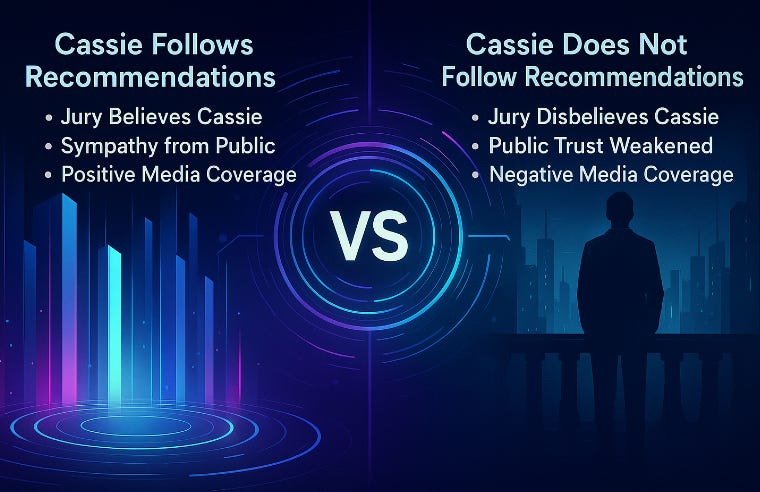MCAI Lex Vision: Advisory to Cassie Ventura- Strategic Guidance for Testimony, Public Trust, and Life Beyond Litigation
Hypothetical Simulation Memo
In a hypothetical scenario, MCAI was retained to simulate, forecast and advise on how Cassie Ventura could best navigate the legal battle involving Diddy, with a focus on three areas: her performance in the courtroom, her reputation in the public eye, and her ability to build a meaningful and secure life afterward. To do this, we created digital models of Cassie, Diddy, the legal system, and public opinion, and tested different strategies by simulating how these models would interact.
I. Courtroom Strategy: Honest, Structured, and Calm Testimony
Cassie’s testimony has already drawn significant media attention. Multiple outlets reported on her composed presence and the emotional intensity of Diddy’s reaction during court proceedings. In addition, it’s important to acknowledge that this is not the first legal confrontation between Cassie and Diddy. A prior civil lawsuit was filed by Cassie, which resulted in a financial settlement. This context matters—while some may try to frame the current case as opportunistic, the prior settlement actually supports the consistency of Cassie’s claims over time.
Cassie’s story is powerful and morally grounded, but we anticipate that Diddy’s legal team will try to confuse the timeline, question her motivations, and suggest she stayed in the relationship voluntarily. However, this advisory is focused entirely on Cassie—her voice, her strategy, and her future—not on the broader legal consequences for Diddy or others involved.
Recommendations:
• Stick to the Timeline: Lay out the events in clear order, showing how her experiences followed a pattern of control and harm. Focus on long-term behaviors rather than isolated moments.
• Show Calm, Not Anger: Remaining composed under pressure will make her more believable. Our simulations show that emotional control is more persuasive than visible outrage, especially when contrasted with Diddy’s more reactive tendencies.
• Address Memory Gaps Openly: If there are any gaps in memory caused by trauma, acknowledge them directly. This makes the testimony feel more human and transparent, which builds credibility.
Diddy’s model revealed weaknesses that Cassie can exploit: his explanations often contradict themselves, he tends to appear defensive when challenged, and he relies on polished storytelling that doesn’t hold up under detailed questioning. By telling her truth clearly and calmly, Cassie can highlight these contrasts and gain the court’s trust.
II. Public Trust Strategy: Reclaiming the Narrative and Earning Respect
Public opinion is shifting. Many people now recognize patterns of abuse and control in powerful industries. Our simulations show that Cassie’s voice can be more trusted and impactful than Diddy’s if she speaks clearly and chooses the right moments and platforms.
Recommendations:
• Tell a Complete Story: This is not just a headline or a reveal—it’s the closing chapter of a long personal journey. Position it as growth and clarity, not revenge or chaos.
• Choose the Right Platforms: Share her story with people and outlets who value truth and depth. Avoid flashy or exploitative interviews that could cheapen her message.
• Stand with Other Survivors: Align with others who have gone through similar experiences. Their support will strengthen her voice and place it in a broader context of justice and reform.
Diddy’s public image depends on polish, performance, and loyal fans—but his ability to inspire trust has weakened outside his inner circle. Cassie, by contrast, gains trust when she is emotionally honest and clear about her intentions.
III. Life After Litigation: Rebuilding with Purpose and Protection
We explored possible futures for Cassie and found three strong paths forward, depending on how she wants to shape her next chapter:
1. Start a Healing or Reform Initiative: Focus on helping others—especially women or survivors—through support programs or advocacy for safer industry standards.
2. Write a Memoir or Create a Documentary: Tell the full story in a long-form format that allows for depth, reflection, and emotional nuance.
3. Maintain a Low Profile with Selective Influence: Choose private or behind-the-scenes roles that still shape public dialogue without constant attention.
The most important factor is emotional safety. Cassie should take care to protect her peace while building something meaningful. Our simulations show that when she stays true to her values and avoids being pulled into reactive or chaotic situations, she earns long-term trust and influence.
IV. Forecast: Different Futures Depending on Strategic Choices
Our modeling reveals two likely paths depending on whether Cassie follows the guidance outlined above.
Path A: Clear, Honest Strategy
• In Court: Cassie is seen as truthful and steady. Judges and jurors understand the full picture.
• In Public: People shift from curiosity to respect. Her message gains long-lasting support.
• After the Trial: Cassie becomes a trusted figure, with influence that goes beyond celebrity.
Overall Outcome: Her story helps change how the public views survivors, and she leads from a place of calm authority.
Scores in Our Simulation:
• Long-Term Clarity and Stability: 83
• Moral Consistency Over Time: 84
• Emotional Authenticity: 82
• Narrative Clarity: 77
• Personal Credibility: 79
• Overall Integrity: 85
• Believability of Story: 76
Path B: Inconsistent or Reactive Strategy
• In Court: Cassie’s message is muddled, leading to doubt or confusion.
• In Public: People remain divided—some support her, others question her motives.
• After the Trial: Emotional fatigue and unclear messaging limit her ability to lead or heal.
Overall Outcome: She is seen as a survivor, but not one who reshaped the system.
Scores in Our Simulation:
• Long-Term Clarity and Stability: 58
• Moral Consistency Over Time: 62
• Emotional Authenticity: 67
• Narrative Clarity: 61
• Personal Credibility: 63
• Overall Integrity: 60
• Believability of Story: 54
V. Conclusion: Winning with Clarity, Not Chaos
Our simulation confirms that the most powerful tool Cassie has is her ability to stay consistent, composed, and emotionally grounded. By following a thoughtful, honest strategy in court and in public, she doesn’t just win a legal battle—she reshapes how survivors are understood and respected.
This isn’t just a lawsuit. It’s a turning point in how we talk about power, trust, and harm. Cassie’s truth—shared with clarity—can help move that conversation forward.




